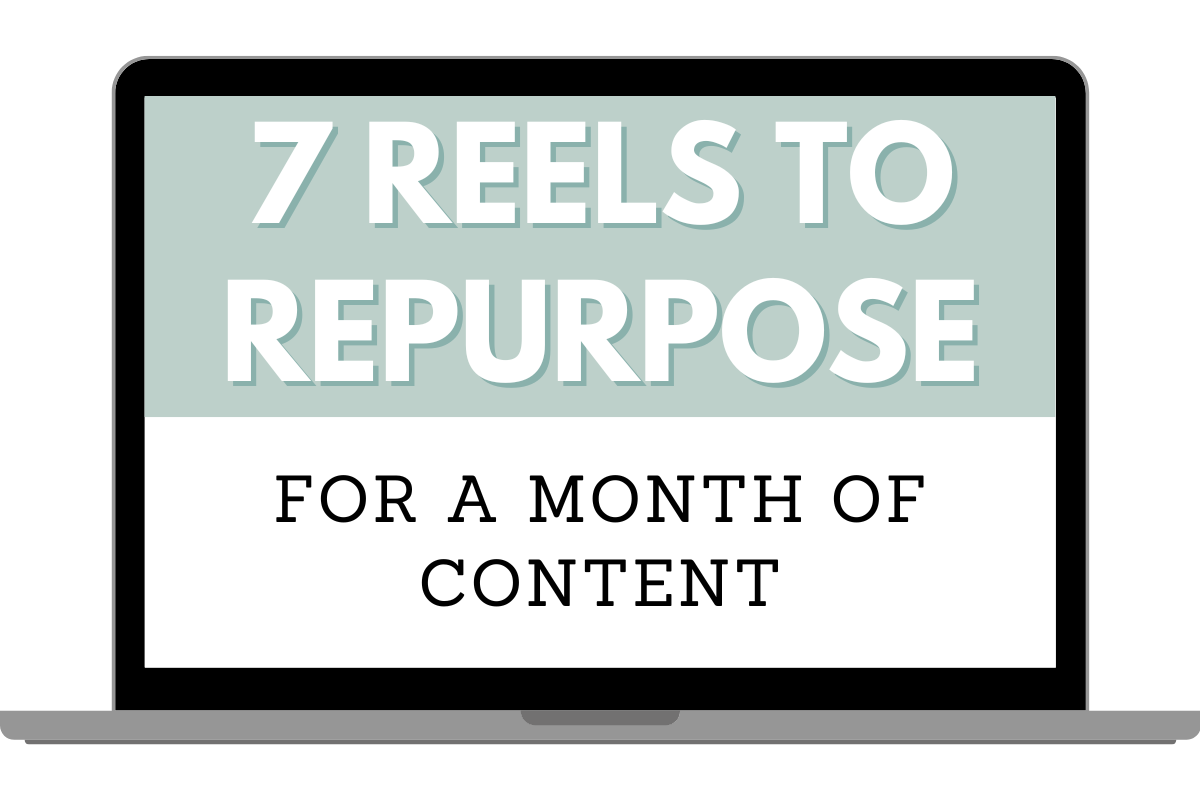
5 Ways to Get More Podcast Listeners
Disclosure: This post may contain affiliate links. I may receive a small commission at no additional cost to you if you purchase a product or service using one of the affiliate links within this post. I love all my affiliates and make sure they align with my brand before allowing them into my blog. Thanks for your support!
Starting a podcast can be such a fun and creative direction to take your online business.
That being said, even after you start a podcast, growing an audience is an entirely different thing!
The question is how do you reach more people and keep them coming back for more?
Thankfully, there are quite a few different ways to go about growing your podcast's audience.
In this blog post, we'll dive into five strategies to help bring in new listeners and build a podcast community.
How to Get More Podcast Listeners
When you are just starting your podcasting journey, it can feel difficult to grow your audience.
I mean, where do you start?
Even more frustrating is if you have been podcasting for a while but your audience has still not grown.
If you resonate at all with these, then I wrote this blog post with you in mind!
Let's get into it!
1. A Consistent Publishing Schedule
You might have heard this before, but "consistency is key" applies to podcasting too!
When you post your episodes on a schedule, your audience knows when they can listen to your next episode.
It doesn't matter if you release episodes weekly, bi-weekly, or monthly.
This applies no matter how often you release episodes.
Why Consistency Matters
Anticipation: When your audience knows exactly when to expect a new episode, you allow them the chance to look forward to it and plan to listen.
Trust: Consistency shows your audience that you are reliable. Your listeners will see that you are committed to giving them new content regularly.
Consistency Tips
Plan Ahead: Create a calendar and plan your podcasting schedule. Planning episodes can give you guidance on your tasks and deadlines.
Batch Recording: Recording multiple episodes in one sitting is a technique I've seen used time and time again. This way, you only have to record for a certain amount of time and can get it out of the way. It can be great especially if you find recording your podcast feels draining.
Set Realistic Goals: Make sure you choose a publishing schedule that you can handle. It's better to start with a bi-weekly schedule and stick to it than to go for weekly episodes but struggle to keep up.
2. Collaborate!
Collaboration is a fantastic way to introduce new audiences to your podcast.
By working with other podcasters and entrepreneurs who align with your message, you can tap into their audience and vice versa.
This is one of my favourite podcast growth strategies!
What's The Big Deal?
Audience Sharing: When you collaborate with someone who already has an audience, you get to show your podcast to new potential listeners who might not have discovered you otherwise.
New Perspectives: Collaborations can bring new ideas and perspectives to your content, which may mean your audience learns even more than they could have if it were just you.
How to Collaborate
Invite Them: Invite other podcasters or entrepreneurs as guests on your show. Make sure you choose guests who align with your message!
Co-Hosting: Co-host an episode or a series with another podcaster. This creates a blend of styles and content, bringing together both of your audiences.
Events: Create joint projects such as webinars, live events, or special episodes. Then, promote these events across both your platforms, bringing together both of your audiences.
3. Use Social Media
I'm just going to say it.
Social media is one of the best tools to promote your podcast.
Platforms like Twitter, Instagram, Facebook, and LinkedIn have so much potential to reach and engage with a larger audience than what you may be used to.
Be sure you are using these platforms strategically and consistently.
Social Media Strategies
Clips: Posting short clips from your episodes can grab attention so people will want to listen to the full episode. You can also use subtitles to make the clips more accessible.
Highlights: Highlight interesting points from your episodes. This not only promotes your podcast but also gives value to your followers.
Behind-the-scenes: Share behind-the-scenes photos or videos of your podcasting process. This can make your audience feel more connected to you and your show.
Engage with Your Audience: Respond to comments and ask questions. Engaging with your audience can help keep them invested in your podcast.
Use What You Learn
Another way to use social media is to share something interesting you learned from one of your episodes.
For example, if you and your guest discussed an interesting topic, create a post about it.
This promotes your podcast and shows that you have valuable information.
4. SEO and Show Notes
Search Engine Optimization (SEO) isn't only for websites and blogs; podcasts can use it too!
Optimizing your podcast for search engines can help you attract new listeners.
One of the best ways to do this is through detailed show notes.
The Importance Of SEO
People Can Find You Easier: By adding relevant keywords, you can rank higher in search results on platforms like Google and podcast directories.
Targeted Traffic: SEO helps attract listeners who are specifically searching for things related to your podcast’s topics, helping you bring in the audience you are looking for.
How to Make Show Notes
Descriptions: Write detailed descriptions of each episode. Include topics covered and any guests.
Keywords: Use relevant keywords that your target audience might be searching for. Add these keywords to your show notes and episode titles.
Timestamps: Adding timestamps for different segments or topics discussed in the episode may make your episodes more enjoyable.
Links and Resources: Add links to things mentioned in the episode. This adds value for your listeners and may improve your SEO.
5. Be a Guest on Other Podcasts
And finally, you can grow your podcast audience by appearing as a guest on other podcasts.
This strategy allows you to put yourself in front of audiences who are already interested in podcasts, making them more likely to check out yours.
You also don't have to put the episode at the end as the podcast itself isn't yours.
You just need to show up, record, and promote!
Perks to Being a Guest
New Audiences: Appearing on another podcast introduces you to its listeners, who may want to listen to yours if it aligns with their interests or if they like you.
Networking Opportunities: Guest appearances can give you connections with other podcasters in your industry.
Tips to Be Invited To Another Podcast
Research Podcasts: Look for podcasts that have a similar audience or focus on topics that align with yours.
Send an Email: When reaching out to podcast hosts, make each of them a personalized email. Tell them how your expertise and story would be valuable to their audience.
Showcase Your Value: Tell them about your audience and your podcast. Show them how your podcasts align with each other.
Follow-up: If you don’t hear back immediately, don’t be discouraged! Follow up in another email with similar contents as the first but asking if they received your previous email.
Are You Ready To Bring In More Listeners?
Thanks for reading this far!
Remember, you should focus on giving value to your audience, engaging with your audience, and embracing the things that set you apart from other podcasters.
If you want to chat about anything I mentioned in this blog post, I'd love it if you DM me on Instagram!
See you soon!
Isabella

5 Ways to Get More Podcast Listeners
Disclosure: This post may contain affiliate links. I may receive a small commission at no additional cost to you if you purchase a product or service using one of the affiliate links within this post. I love all my affiliates and make sure they align with my brand before allowing them into my blog. Thanks for your support!
Starting a podcast can be such a fun and creative direction to take your online business.
That being said, even after you start a podcast, growing an audience is an entirely different thing!
The question is how do you reach more people and keep them coming back for more?
Thankfully, there are quite a few different ways to go about growing your podcast's audience.
In this blog post, we'll dive into five strategies to help bring in new listeners and build a podcast community.
How to Get More Podcast Listeners
When you are just starting your podcasting journey, it can feel difficult to grow your audience.
I mean, where do you start?
Even more frustrating is if you have been podcasting for a while but your audience has still not grown.
If you resonate at all with these, then I wrote this blog post with you in mind!
Let's get into it!
1. A Consistent Publishing Schedule
You might have heard this before, but "consistency is key" applies to podcasting too!
When you post your episodes on a schedule, your audience knows when they can listen to your next episode.
It doesn't matter if you release episodes weekly, bi-weekly, or monthly.
This applies no matter how often you release episodes.
Why Consistency Matters
Anticipation: When your audience knows exactly when to expect a new episode, you allow them the chance to look forward to it and plan to listen.
Trust: Consistency shows your audience that you are reliable. Your listeners will see that you are committed to giving them new content regularly.
Consistency Tips
Plan Ahead: Create a calendar and plan your podcasting schedule. Planning episodes can give you guidance on your tasks and deadlines.
Batch Recording: Recording multiple episodes in one sitting is a technique I've seen used time and time again. This way, you only have to record for a certain amount of time and can get it out of the way. It can be great especially if you find recording your podcast feels draining.
Set Realistic Goals: Make sure you choose a publishing schedule that you can handle. It's better to start with a bi-weekly schedule and stick to it than to go for weekly episodes but struggle to keep up.
2. Collaborate!
Collaboration is a fantastic way to introduce new audiences to your podcast.
By working with other podcasters and entrepreneurs who align with your message, you can tap into their audience and vice versa.
This is one of my favourite podcast growth strategies!
What's The Big Deal?
Audience Sharing: When you collaborate with someone who already has an audience, you get to show your podcast to new potential listeners who might not have discovered you otherwise.
New Perspectives: Collaborations can bring new ideas and perspectives to your content, which may mean your audience learns even more than they could have if it were just you.
How to Collaborate
Invite Them: Invite other podcasters or entrepreneurs as guests on your show. Make sure you choose guests who align with your message!
Co-Hosting: Co-host an episode or a series with another podcaster. This creates a blend of styles and content, bringing together both of your audiences.
Events: Create joint projects such as webinars, live events, or special episodes. Then, promote these events across both your platforms, bringing together both of your audiences.
3. Use Social Media
I'm just going to say it.
Social media is one of the best tools to promote your podcast.
Platforms like Twitter, Instagram, Facebook, and LinkedIn have so much potential to reach and engage with a larger audience than what you may be used to.
Be sure you are using these platforms strategically and consistently.
Social Media Strategies
Clips: Posting short clips from your episodes can grab attention so people will want to listen to the full episode. You can also use subtitles to make the clips more accessible.
Highlights: Highlight interesting points from your episodes. This not only promotes your podcast but also gives value to your followers.
Behind-the-scenes: Share behind-the-scenes photos or videos of your podcasting process. This can make your audience feel more connected to you and your show.
Engage with Your Audience: Respond to comments and ask questions. Engaging with your audience can help keep them invested in your podcast.
Use What You Learn
Another way to use social media is to share something interesting you learned from one of your episodes.
For example, if you and your guest discussed an interesting topic, create a post about it.
This promotes your podcast and shows that you have valuable information.
4. SEO and Show Notes
Search Engine Optimization (SEO) isn't only for websites and blogs; podcasts can use it too!
Optimizing your podcast for search engines can help you attract new listeners.
One of the best ways to do this is through detailed show notes.
The Importance Of SEO
People Can Find You Easier: By adding relevant keywords, you can rank higher in search results on platforms like Google and podcast directories.
Targeted Traffic: SEO helps attract listeners who are specifically searching for things related to your podcast’s topics, helping you bring in the audience you are looking for.
How to Make Show Notes
Descriptions: Write detailed descriptions of each episode. Include topics covered and any guests.
Keywords: Use relevant keywords that your target audience might be searching for. Add these keywords to your show notes and episode titles.
Timestamps: Adding timestamps for different segments or topics discussed in the episode may make your episodes more enjoyable.
Links and Resources: Add links to things mentioned in the episode. This adds value for your listeners and may improve your SEO.
5. Be a Guest on Other Podcasts
And finally, you can grow your podcast audience by appearing as a guest on other podcasts.
This strategy allows you to put yourself in front of audiences who are already interested in podcasts, making them more likely to check out yours.
You also don't have to put the episode at the end as the podcast itself isn't yours.
You just need to show up, record, and promote!
Perks to Being a Guest
New Audiences: Appearing on another podcast introduces you to its listeners, who may want to listen to yours if it aligns with their interests or if they like you.
Networking Opportunities: Guest appearances can give you connections with other podcasters in your industry.
Tips to Be Invited To Another Podcast
Research Podcasts: Look for podcasts that have a similar audience or focus on topics that align with yours.
Send an Email: When reaching out to podcast hosts, make each of them a personalized email. Tell them how your expertise and story would be valuable to their audience.
Showcase Your Value: Tell them about your audience and your podcast. Show them how your podcasts align with each other.
Follow-up: If you don’t hear back immediately, don’t be discouraged! Follow up in another email with similar contents as the first but asking if they received your previous email.
Are You Ready To Bring In More Listeners?
Thanks for reading this far!
Remember, you should focus on giving value to your audience, engaging with your audience, and embracing the things that set you apart from other podcasters.
If you want to chat about anything I mentioned in this blog post, I'd love it if you DM me on Instagram!
See you soon!
Isabella





